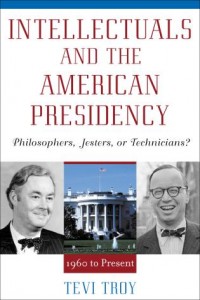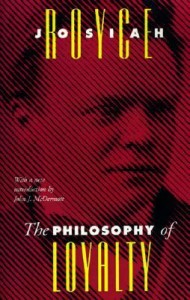A good friend of mine monitors all things Josiah Royce. She passed along this tidbit earlier today (from here):
[California Governor Jerry] Brown has more immediate concerns, including his annual budget proposal and State of the State address in January.
In preparation for the latter Brown said he is reading Josiah Royce, a philosopher who was born in Grass Valley in the 1800s and who Brown said “had something called the philosophy of loyalty.”
Brown said he hasn’t decided if Royce or his ideas about loyalty will make it into the address, but he said, “I’m thinking about whether that can apply to California … You’ve got to have a sense that it’s more important than your own particular interest.”
This caused me to wonder how much we know about the links between American philosophers and politicians as a general class, past and present.
We have discussed here before, on the prompt of Ben Alpers, what he called “White House Intellectuals” and “Campaign Intellectuals.”
I followed up Ben’s White House intellectual post with this discussion of historians and the White House, and Ben added to that discussion.  Furthermore, in his September 2010 post on campaign intellectuals, Ben noted all the blog discussions about Obama’s status as an intellectual (all prompted in the fall of 2010 by James Kloppenberg’s book, Reading Obama, but preceded in April 2010 in post by me about Tevi Troy’s assessment of President Obama in relation to Troy’s 2003 book, Intellectuals and the American Presidency: Philosophers, Jesters, or Technicians?).*
Furthermore, in his September 2010 post on campaign intellectuals, Ben noted all the blog discussions about Obama’s status as an intellectual (all prompted in the fall of 2010 by James Kloppenberg’s book, Reading Obama, but preceded in April 2010 in post by me about Tevi Troy’s assessment of President Obama in relation to Troy’s 2003 book, Intellectuals and the American Presidency: Philosophers, Jesters, or Technicians?).*
But what do we know about philosophers, specifically, and their connection to all kinds of politicians—or even prominent political appointments? We now know that Jerry Brown consults (or will consult) with Josiah Royce on loyalty. But what about other politicians on Kant and duty, or on Kant in relation to world peace and government? How about Dewey and educational policy? I know, for instance, that Mortimer Adler offered his services to Walter Mondale in relation to countering Reagan era educational policy (p. 178 in my book). And, courtesy of Louis Menand, I’m guessing that every intellectual historian knows that Supreme Court Justice Oliver Wendell Holmes, Jr. was connected to William James and Charles Sanders Peirce via their “Metaphysical Club” at Harvard University.
Was Richard Rorty ever consulted by Ted Kennedy or Jimmy Carter? Or John Rawls or Michael Walzer? Did Bobbie Kennedy ever reach out to Herbert Marcuse or C. Wright Mills? The possible connections here are endless. – TL
—————————————
* My post about Tevi Troy was prompted by this National Affairs article, authored by him.


15 Thoughts on this Post
S-USIH Comment Policy
We ask that those who participate in the discussions generated in the Comments section do so with the same decorum as they would in any other academic setting or context. Since the USIH bloggers write under our real names, we would prefer that our commenters also identify themselves by their real name. As our primary goal is to stimulate and engage in fruitful and productive discussion, ad hominem attacks (personal or professional), unnecessary insults, and/or mean-spiritedness have no place in the USIH Blog’s Comments section. Therefore, we reserve the right to remove any comments that contain any of the above and/or are not intended to further the discussion of the topic of the post. We welcome suggestions for corrections to any of our posts. As the official blog of the Society of US Intellectual History, we hope to foster a diverse community of scholars and readers who engage with one another in discussions of US intellectual history, broadly understood.
How could I leave out the known connections between Paul Ryan and Ayn Rand!
WWWJD (What Would W.’s Jesus Do?)?
Indeed. From this Dec. 1999 story:
Each candidate was asked what “political philosopher or thinker” he identified with most. (In an interview Tuesday morning with Des Moines Register reporters and editors, Bush said he understood the question to be, “Who”s had the most influence on your life?”)
Bush, the third candidate to answer in the debate, said, “Christ, because he changed my heart.”
Moderator John Bachman pressed for more and Bush added: “When you turn your heart and your life over to Christ, when you accept Christ as the savior, it changes your heart. It changes your life. And that’s what happened to me.”
Sen. Orrin Hatch, a Mormon from Utah, followed Bush. Hatch cited Abraham Lincoln and Ronald Reagan as his political role models, then added: “But I bear witness to Christ, too. I really know him to be the savior of the world. And that means more to me than almost anything else I know.”
Gary Bauer, a Baptist, quoted Scripture in naming Christ as his favorite political thinker. “If America’s in trouble in the next century, it will be because we forgot what he taught us,” Bauer said.
I guess this post is less about “links” and “connections” than about how we (not just politicians) expropriate public intellectuals for our respective purposes? This seems to work better at a distance: What McCain-Reagan did with Martin Luther King (still can’t get over that one) or what neocons and maybe Obama have done with Niebuhr. Closer isn’t always better: the failed Lasch-Carter project, for instance.
Mark: I was specifically thinking about philosophers with this post. But yes, those philosophers will probably qualify as public intellectuals. Who is a philosopher? I’m not sure I’m qualified to draw the lines of demarcation.
I realize this is a blog post, not an essay or an article, but I think you have to observe explicitly that some politicians — in the U.S. case, perhaps a rather select few — have some claim to be considered intellectuals themselves and that the politicians in that small category are more likely to know about and/or read and/or consult w philosophers etc.
Thus Jerry Brown is kind of an intellectual himself and arguably unique — no other sitting governor is likely, I’d bet, to have even heard of Josiah Royce. And Pres. Obama has some substantial claim to the label ‘intellectual’, as you noted. Eugene McCarthy was an intellectual, or at least wrote poetry. George McGovern had a PhD in history from Northwestern, iirc. But Ted Kennedy wasn’t an intellectual — which is not a criticism, he was a v. good legislator, just not an intellectual. Bobby Kennedy liked to quote Aeschylus, I think, but is not really someone likely to have consulted then-living philosophers or other academics, except for those few who were in the Kennedy inner circle (e.g. Schlesinger, Galbraith, the Bundys, Rostow).
As for O.W. Holmes Jr., (again) a special case. Holmes was a voracious, omnivorous reader, an tireless letter writer, unquestionably an intellectual, correspondent and friend of e.g.: Frankfurter (incl. before the latter went on the Court himself); Lippmann; Harold Laski; etc etc. Holmes’s connection as a young man w James and Peirce is just the start of it. (I base this mainly on having read some years ago Sheldon Novick’s biography of Holmes, which I liked but for some reason don’t seem to have on my shelf any more. Some of these connections also come up in Steel’s book on Lippmann, which I read many years ago. I haven’t read The Metaphysical Club.)
correction;
“a tireless letter writer”
You’re correct, LFC, that a politico-intellectual is more likely to consult with a philosopher. But I didn’t want to assume that as a precondition. In this post I just wanted to tease out as many links as possible—behind our (tired) prior conversations about Obama’s intellectual bona fides.
Bill Bradley counted Cornell West and Robert Westbrook (not a philosopher, but a historian of Dewey, so kind of close!) among his advisors. I think West also lent support to Ralph Nader in 2000. I don’t think Dewey himself was particularly close to major political figures of his era–he notoriously supported Wilson’s policy in WW I, but was later a Norman Thomas socialist and critic of the New Deal and FDR from the left, I think. Jean Bethke Elshtain (recently departed) also offered notorious support for Bush’s Iraq policy under “just war doctrine,” but I don’t think she had the president’s ear–she was one of many hawk intellectuals (e.g. George Packer, Christopher Hitchens, etc.) post-911.
Very interesting, Dan. I had no idea that Cornell West really wanted action in this direction. But I confess to superficial knowledge of West’s life and career.
I was on Senator Bill Bradley’s staff as a senior counselor in 1994. He had an annual meeting with a number of academics, a full day of wide-ranging conversation. Richard Rorty and Cornel West were both regular participants in this gathering (as was historian James McPherson–the thing had a definite Princetonian cast to it). As I recall, it was Rorty who suggested the common reading from which our discussions departed in the meeting I attended: Edward Luttwak, The Endangered American Dream. Bradley also had a remarkable member of his staff, Marta Tellado, who served as his liaison to academics and intellectuals. She would bring in people for sometimes lengthy one-on-one conversations with him. I sat in on several of these, but I do not recall any philosophers, though I do remember the meeting with Amartya Sen, whose work certainly has a strong philosophical dimension. Bradley himself, who like his colleague Daniel Patrick Moynihan wrote more books than most Senators read, had done quite a bit of reading in philosophy or, at least, political theory. I remember in particular talking with him about Charles Taylor. In all this, Bradley was quite idiosyncratic. Every Senator had an economist or three at his command (this was during the Clinton health care fiasco), but no one was weird enough to have a humanist such as myself on the payroll.
Thanks for this—remembrances from a primary source!
That Marta Tellado tidbit is fascinating. Here’s a bio I found for her (VP of communications since 2009).
I find it heartening to know that Bradley had read some Charles Taylor—though one always worries more about what any given politician might take from their readings. – TL
I forgot that Marta had a PhD, though I vaguely recall she was ABD when I was working with her. Another impressive intellectual on Bradley’s staff at the time was Mark Schmitt, his domestic policy advisor, who was later editor of The American Prospect. I think he is at the New America Foundation now. He used to have a great blog, The Decembrist, which tells you something about his politics and the catholicity of his learning.
-RW
Robert: I hope you’ve considered giving an oral history to someone on your experience? Or perhaps you’ve already done one? There are so many interesting connections here. – TL
Addendum: I wish every politician had 3-4 humanists on their payroll.